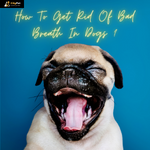How To Get Rid of Bad breath in Dogs?
Bad breath in dogs is typically characterized by an unpleasant odor coming from their mouth. It can be caused by a number of factors, such as poor oral hygiene, periodontal disease, bacteria in the mouth causing decay and smelly sulfur compounds, or an underlying health issue such as kidney or liver disease.
Regular dental cleanings and maintaining good oral hygiene can help prevent bad breath in dogs. If you notice persistent bad breath in your dog, it’s important to consult with a veterinarian to determine the root cause and appropriate treatment.
Causes of Bad Breath in Dogs
the most common causes of bad breath in dogs are:
- Poor oral hygiene
- Periodontal disease (dental or gum disease)
- Bacteria in the mouth cause decay and smelly sulfur compounds
- Something they ate
- Kidney disease
- Liver disease
It’s important to note that bad breath in dogs can also indicate other underlying health issues, so it’s best to consult with a veterinarian to determine the root cause and appropriate treatment.
1. Dental disease:
Dental disease is a common cause of bad breath in dogs. This can include periodontal disease, which is characterized by infection and inflammation of the gums, as well as fractured teeth, oral tumors, and other oral health issues. These conditions can lead to the buildup of bacteria in the mouth, which can produce unpleasant odors and contribute to bad breath.
In addition, more serious dental issues such as abscesses and gum disease can lead to infections that can spread to other parts of the body, making regular dental care for dogs important in maintaining their overall health.
2. Mucus Build-up
Dogs who suffer from allergies can experience chronic bad breath due to their congested sinuses and lungs. When the nose is constantly filled with secretions, it causes an unpleasant odor that cannot be avoided. Fortunately, there are ways to help alleviate these symptoms so your pup can have fresher breath.
3. Pregnancy/nursing
During pregnancy, nursing, and lactation in dogs, hormonal changes can cause an increase in oral bacteria leading to bad breath. Additionally, many pregnant dogs experience nausea which leads to increased salivation and the expiration of more gases from their mouths.
4. Not Brushing Your dog’s Teeth Regularly
Maintaining your dog’s oral hygiene is a crucial part of keeping their breath fresh and healthy. Brushing your pup’s teeth should be done at least twice daily, using toothpaste that contains cavity-fighting ingredients. For an alternative to regular brushing, dental chews are also an option – just make sure they’re edible!
5. Food Allergies
Food allergies can cause bad breath in dogs if they manifest as GI upset or gastrointestinal diseases. Food allergy symptoms in dogs can include vomiting, diarrhea, excessive gas, and abdominal discomfort, all of which can contribute to bad breath.
Additionally, dogs with food allergies may develop inflammation in the mouth, which can lead to oral malodor. Therefore, it’s possible that food allergies can indirectly cause bad breath in dogs through various mechanisms. However, it’s always best to consult a veterinarian when your dog experiences any unusual symptoms or changes in behavior.
6. Dry Mouth
When a dog’s mouth is dry, it means they’re not producing enough saliva to keep their mouth clean and moist. Saliva contains antibacterial compounds that help fight infection and prevent the growth of bacteria that cause bad breath. When there’s not enough saliva, bacteria can accumulate in the mouth, and their growth can cause an unpleasant odor, leading to bad breath.
Additionally, a dry mouth can also cause the tongue and gums to become irritated or inflamed, which can also contribute to bad breath. Therefore, a dry mouth can indirectly contribute to bad breath in dogs by allowing bacteria to multiply and spread in the mouth.
7. Achlorhydria
If your dog’s breath has a sulfuric or rotten egg-like smell when he is panting, it could be due to achlorhydria (lack of proper stomach acid production). This occurs when there is an overproduction of stomach acid caused by vomiting or diarrhea, resulting in an imbalance between hydrochloric and stomach acids during digestion.
8. Kidney, Liver, or Diabetes Disease
Kidney, liver or diabetes disease can cause bad breath in dogs through a variety of mechanisms.
In kidney disease, bad breath can be caused by the buildup of urea in the blood. The urea can be excreted through the dog’s breath, giving it a characteristic ammonia or urine-like odor.
In liver disease, the bad breath can be caused by a buildup of toxins in the blood or by a gastrointestinal disturbance, which can both lead to changes in breath odor.
In diabetes, the bad breath can be caused by an excess of ketones in the bloodstream, which can lead to the production of fruity or sweet-smelling breath.
It’s important to note that bad breath alone is not a definitive symptom of any of these conditions, and other symptoms may present as well. Therefore, if your dog has persistent bad breath or any other unusual symptoms, it’s important to consult a veterinarian as soon as possible.
Get rid of Bad breath in Dogs
To get rid of bad breath in dogs, here are some things you can try:
- Brush your dog’s teeth with dog toothpaste and a toothbrush on a regular basis
- Use enzymatically coated dental chews or dental treats to help clean your dog’s teeth.
- Offer to chew toys that promote dental health and encourage your dog to chew.
- Provide your dog with a healthy diet that’s low in sugar and high in nutrients, which can help prevent the buildup of plaque.
- Use a water additive designed to promote good oral hygiene and freshen your dog’s breath.
- Visit your veterinarian for regular dental cleanings and checkups to ensure your dog’s oral health is in good condition.
It’s important to note that persistent bad breath in dogs may be an indication of an underlying health issue, such as periodontal disease or kidney or liver disease. If your dog’s bad breath persists despite your efforts to address it, it’s important to consult with a veterinarian to determine the root cause and appropriate treatment.



















